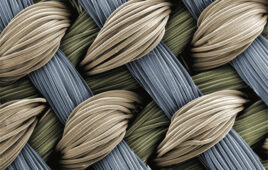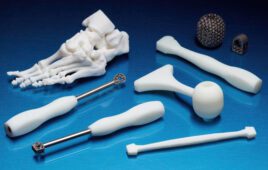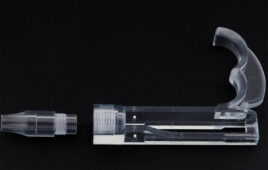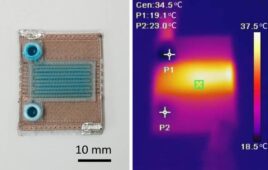
The bio-chip: this is where the placenta can be studied and analyzed [Image from TU Wien]
The placenta is essential for mothers and unborn children to ensure important nutrients and substances are being transferred. It also helps block other substances from passing through. Researchers have been studying what the permeability of the placenta depends on.
TU Wien researchers created an artificial placenta model that resembles a natural placenta. The researchers used a specially-developed femtosecond laser-based 3D printing process to create customized hydrogel membranes within microfluidic chips. The chips are then filled with placenta cells. The newly-created artificial placenta helps researchers determine vital research issues like the exchange of glucose between a mother and child.
“The transport of substances through biological membranes plays an important role in various areas of medicine,” said Aleksandr Ovsianikov from the Institute of Materials Science and Technology at TU Wien, in a press release. “These include the blood-brain barrier, ingestion of food in the stomach and intestine and also the placenta.”
There are a number of studies that show that diseases like diabetes in the mother could have an impact on unborn children. Factors such as high blood pressure can affects how substances are transported to the fetus. The compact TU Wien-developed chips help researchers replicate the organ structures to determine how different aspects of their functions are controlled in various conditions.
“Our chip consists of two areas. One represents the fetus, the other the mother,” said Denise Mandt, one of the researchers on the project. “We use a special 3D printing process to product a partition between them–the artificial placenta membrane.”
The 3D printing process uses materials that can be solidified with laser beams, which allows the researchers to create desired 3D structures, point-by-point with a micrometer resolution range.
“In our case, it involves a hydrogel with good biocompatibility,” Ovsianikov said. “Based on the model of the natural placenta, we product a surface with small, curved villi. The placenta cells can then colonize it, creating a barrier very similar to the natural placenta.”
Important biological parameters can be monitored on the chip. It can record pressure, temperature, geometry and nutrient supply of mini organs, as well as monitor medication administration.
“This organ-on-a-chip technology is a revolutionary approach in biomedicine, which has generated a great deal of interest in clinical diagnostics, biotechnology and pharmaceuticals in recent years,” Peter Earth, head of the cell chip research group and a researcher on the project, said. “The creation of human mini organs on a chip should allow the development of patient-specific therapeutic approaches and also represents a vital method for replacing animal experiments.”
The researchers have tested the artificial placenta chips and have shows that it behaves similarly to a natural placenta. The small molecules can pass through while large ones are held back. The team expects to use the artificial placenta to study nutrient transport from the mother to the fetus.
The research was published in the International Journal of Bioprinting.




